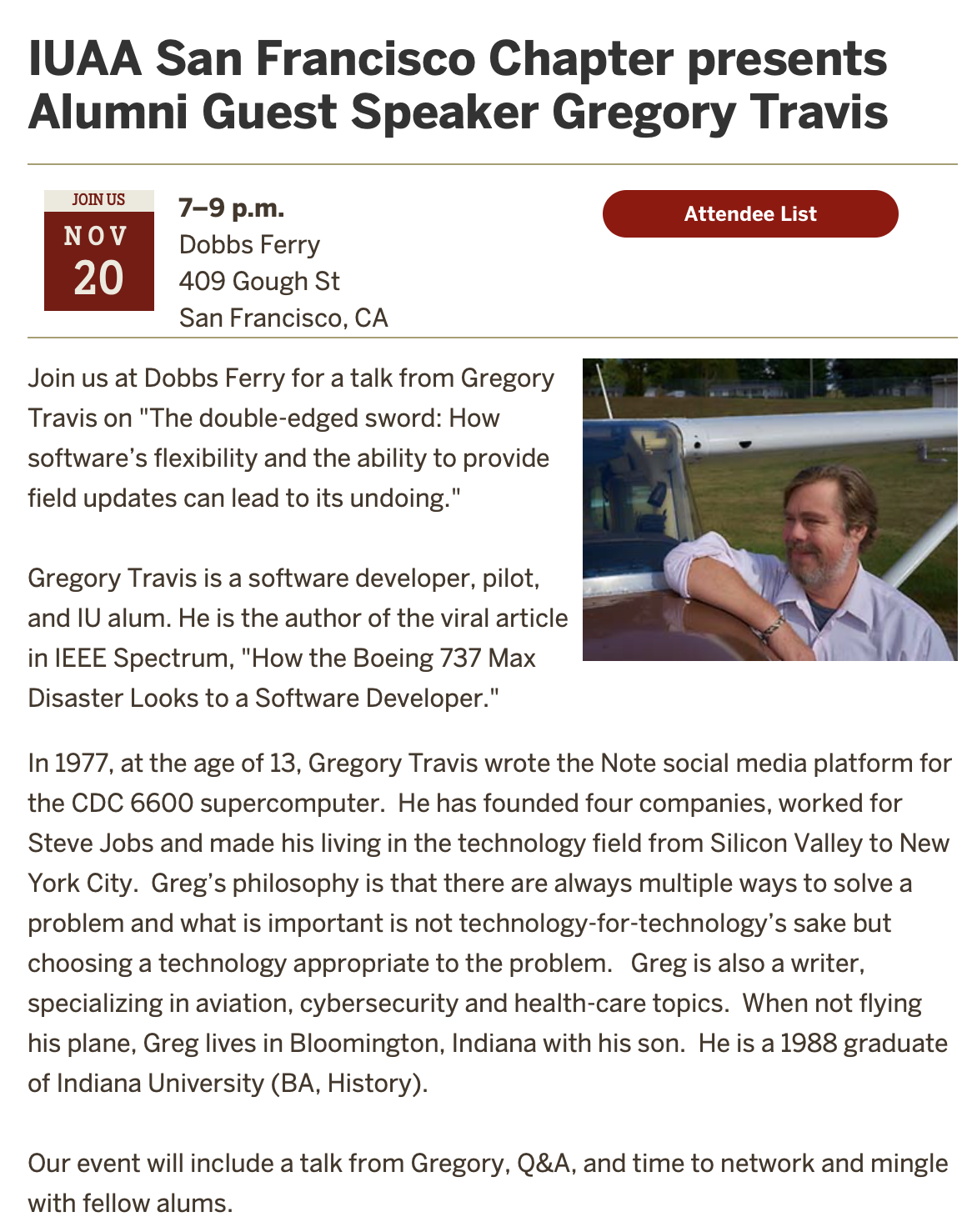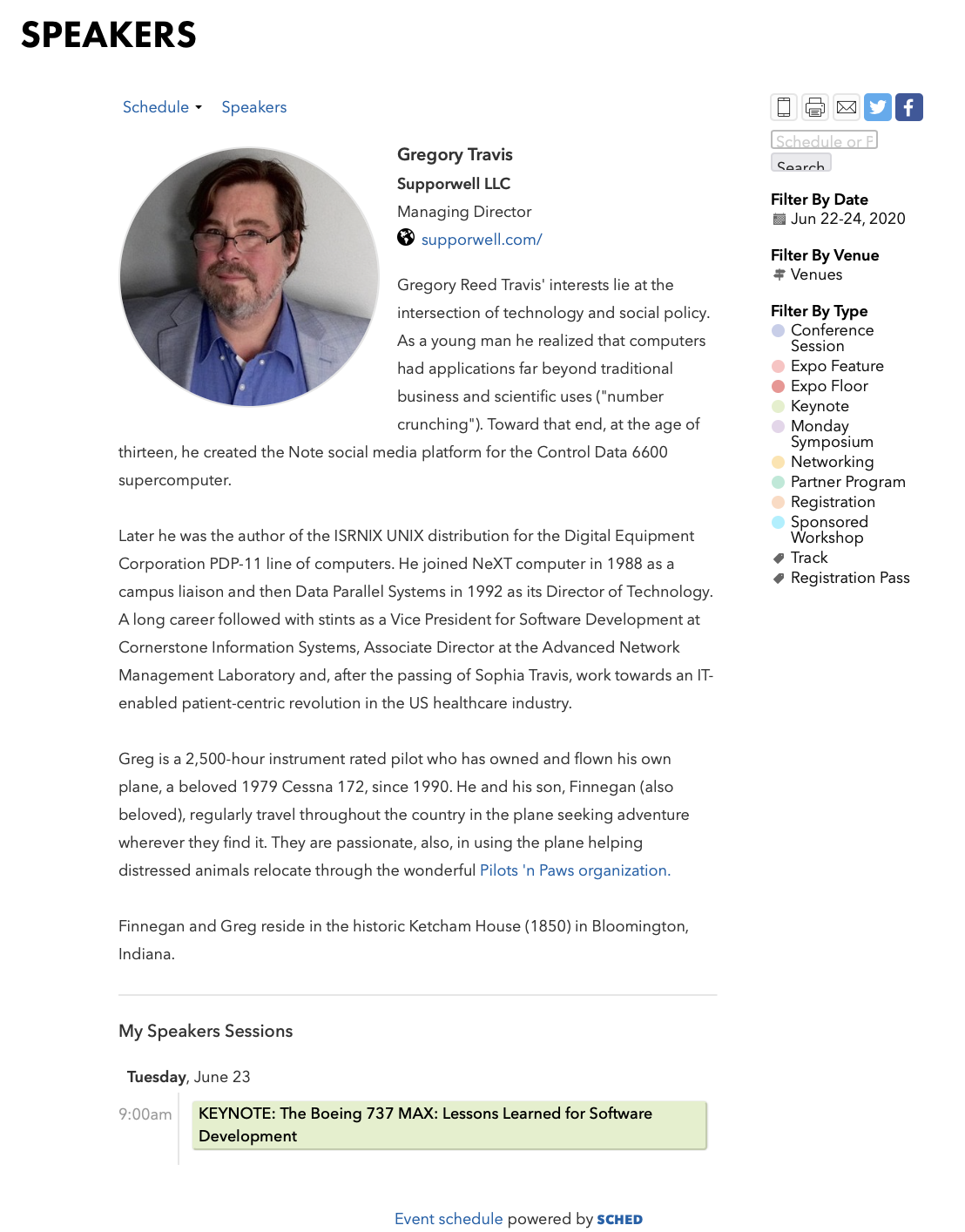Talks and media appearances
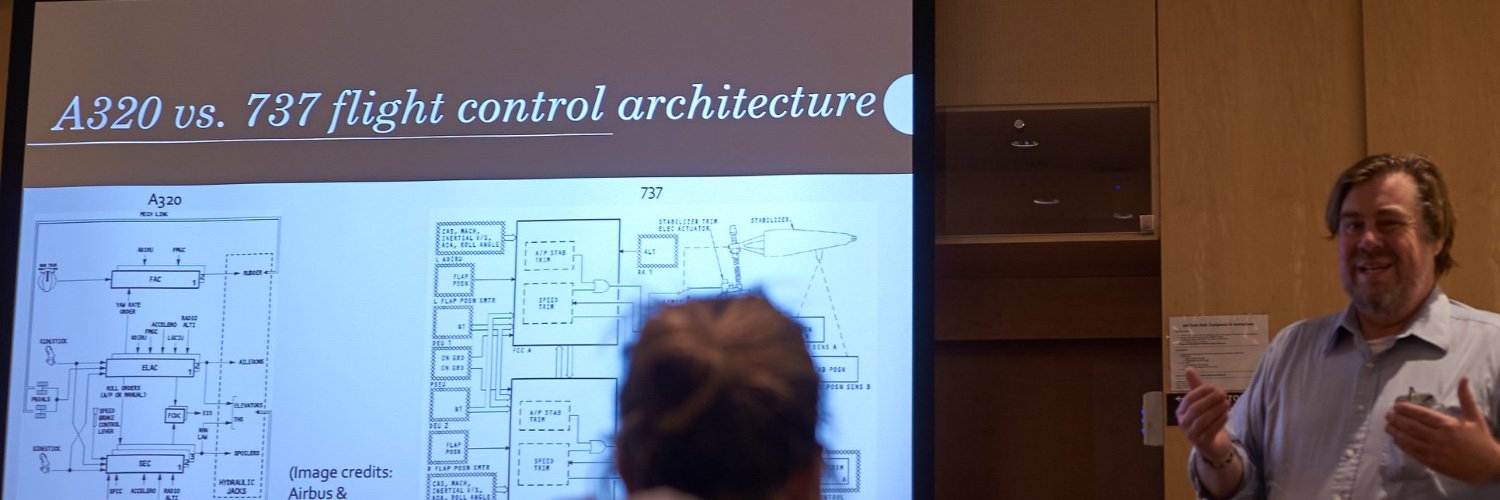
Eastern Air Lines "Kitchen Talk Radio," episode 409. April, 2019
https://www.blogtalkradio.com/capteddie/2019/04/15/episode-409--eal-radio-show
https://www.blogtalkradio.com/capteddie/2019/04/15/episode-409--eal-radio-show
Al Jazeera interview, May 2019
Software is killing us: The inappropriateness of the Rockwell Collins EDFMS-730 autopilot to flight control functions
Gregory Travis is a software developer, pilot, and IU alum. He is the author of the viral article in IEEE Spectrum, "How the Boeing 737 Max Disaster Looks to a Software Developer."
In 1977, at the age of 13, Gregory Travis wrote the Note social media platform for the CDC 6600 supercomputer. He has founded four companies, worked for Steve Jobs and made his living in the technology field from Silicon Valley to New York City. Greg’s philosophy is that there are always multiple ways to solve a problem and what is important is not technology-for-technology’s sake but choosing a technology appropriate to the problem. Greg is also a writer, specializing in aviation, cybersecurity and health-care topics. When not flying his plane, Greg lives in Bloomington, Indiana with his son. He is a 1988 graduate of Indiana University (BA, History).
Presentation
November 2019 presentation, Berkeley. "CS 24-001. Boeing 737 MAX: Money, Machines and Morals in Conflict."
Gregory Travis is a software developer, pilot, and IU alum. He is the author of the viral article in IEEE Spectrum, "How the Boeing 737 Max Disaster Looks to a Software Developer."
In 1977, at the age of 13, Gregory Travis wrote the Note social media platform for the CDC 6600 supercomputer. He has founded four companies, worked for Steve Jobs and made his living in the technology field from Silicon Valley to New York City. Greg’s philosophy is that there are always multiple ways to solve a problem and what is important is not technology-for-technology’s sake but choosing a technology appropriate to the problem. Greg is also a writer, specializing in aviation, cybersecurity and health-care topics. When not flying his plane, Greg lives in Bloomington, Indiana with his son. He is a 1988 graduate of Indiana University (BA, History).
Presentation
November 2019 presentation, Berkeley. "CS 24-001. Boeing 737 MAX: Money, Machines and Morals in Conflict."
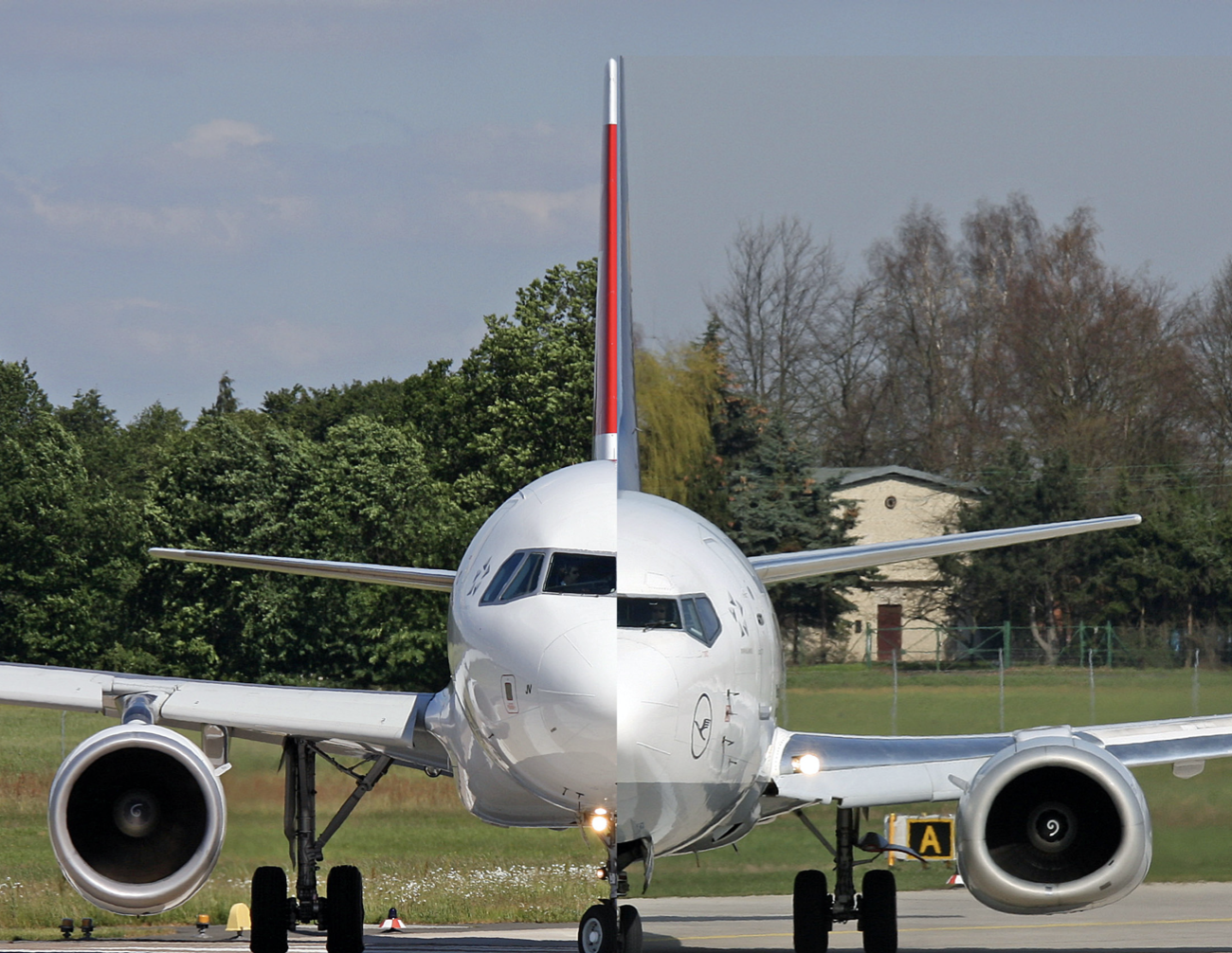
The double-edged sword: How software’s flexibility and the ability to provide field updates can lead to its undoing.
Presentation
November 2019 presentation, San Francisco chapter Indiana University Alumni Association
Presentation
November 2019 presentation, San Francisco chapter Indiana University Alumni Association
Complex or just complicated?
An examination of the difference between complex/empathetic organizations and complicated/authoritarian organizations and the signature of software in that difference. A “top down” forensic analysis of what went wrong at Boeing that describes how the MCAS software came to be and why no mechanism within the company was available to stop it before the tragic loss of 346 lives.
A veteran of the software industry, Gregory Travis has founded four separate companies over his four decades in the business. He is committed to the promise of technology as an instrument of positive social change, particularly in the areas of healthcare, information sharing, and corporate governance. For the past year he has been intensively involved in investigating the tragic circumstances surrounding the Boeing 737 MAX and the cultural factors that enabled that tragedy. His work on this has been cited in or appeared in The New Yorker, Salon, The New Republic, IEEE Spectrum, Al Jazeera (TV) and other media.
www.gregorytravis.com
March 2020 presentation @ Cyber Infrastructure Building, Indiana University (pending)
An examination of the difference between complex/empathetic organizations and complicated/authoritarian organizations and the signature of software in that difference. A “top down” forensic analysis of what went wrong at Boeing that describes how the MCAS software came to be and why no mechanism within the company was available to stop it before the tragic loss of 346 lives.
A veteran of the software industry, Gregory Travis has founded four separate companies over his four decades in the business. He is committed to the promise of technology as an instrument of positive social change, particularly in the areas of healthcare, information sharing, and corporate governance. For the past year he has been intensively involved in investigating the tragic circumstances surrounding the Boeing 737 MAX and the cultural factors that enabled that tragedy. His work on this has been cited in or appeared in The New Yorker, Salon, The New Republic, IEEE Spectrum, Al Jazeera (TV) and other media.
www.gregorytravis.com
March 2020 presentation @ Cyber Infrastructure Building, Indiana University (pending)
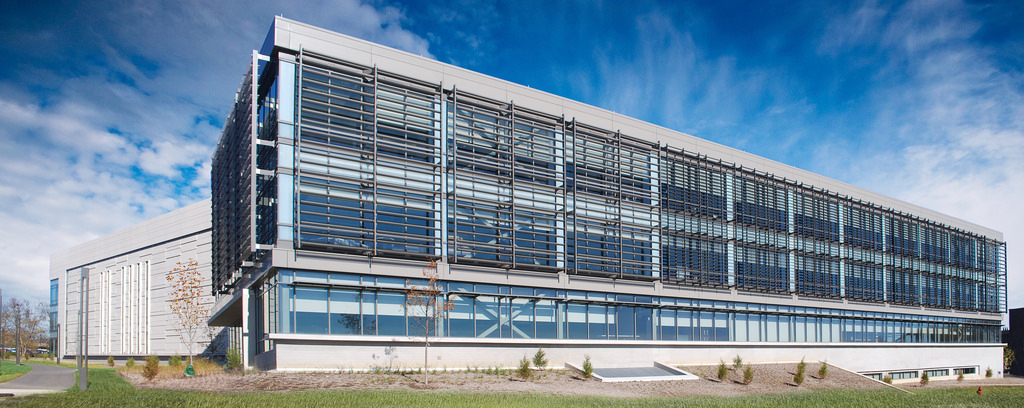
Entrepreneurship and Empathy: how to build a sustainable enterprise using the tools of trust, shared sacrifice and shared gain.
Startups are characterized by a sense of of meritocracy, transparency, tolerance for dissent and shared strategic mission. These are the hallmarks of an empathetic organization. Over time, as the enterprise matures, the empathetic factors can be displaced by tactical considerations that are often financially driven. That, in turn, corrodes the internal bonds of trust and goodwill that were responsible for the organization’s initial success. Cynicism and fear take hold with the result that governance becomes alienated and chaotic.
How can entrepreneurs and leaders anticipate these existential threats, what arguments can be used against short-term financial pressures, and what processes can be put in place to ensure sustainability? Using Boeing as an example of such a transformation we examine what it looks like, how it happens, and what can be done about it.
A veteran of the software industry, Gregory Travis has founded four separate companies over his four decades in the business. He is committed to the promise of technology as an instrument of positive social change, particularly in the areas of healthcare, information sharing, and corporate governance. For the past year he has been intensively involved in investigating the tragic circumstances surrounding the Boeing 737 MAX and the cultural factors that enabled that tragedy. His work on this has been cited in or appeared in The New Yorker, Salon, The New Republic, IEEE Spectrum, Al Jazeera (TV) and other media.
www.gregorytravis.com
March 2020 TEDx presentation (pending)
Startups are characterized by a sense of of meritocracy, transparency, tolerance for dissent and shared strategic mission. These are the hallmarks of an empathetic organization. Over time, as the enterprise matures, the empathetic factors can be displaced by tactical considerations that are often financially driven. That, in turn, corrodes the internal bonds of trust and goodwill that were responsible for the organization’s initial success. Cynicism and fear take hold with the result that governance becomes alienated and chaotic.
How can entrepreneurs and leaders anticipate these existential threats, what arguments can be used against short-term financial pressures, and what processes can be put in place to ensure sustainability? Using Boeing as an example of such a transformation we examine what it looks like, how it happens, and what can be done about it.
A veteran of the software industry, Gregory Travis has founded four separate companies over his four decades in the business. He is committed to the promise of technology as an instrument of positive social change, particularly in the areas of healthcare, information sharing, and corporate governance. For the past year he has been intensively involved in investigating the tragic circumstances surrounding the Boeing 737 MAX and the cultural factors that enabled that tragedy. His work on this has been cited in or appeared in The New Yorker, Salon, The New Republic, IEEE Spectrum, Al Jazeera (TV) and other media.
www.gregorytravis.com
March 2020 TEDx presentation (pending)
Software is a crucial component of the IoT revolution, delivering gains in flexibility, speed-to-market and feature sets. However, deficiencies in standards and requirements together with the ease with which software complexity grows bring risks. As software becomes an integral part of everyday life in our planes, trains and automobiles that risk can easily turn deadly.
We will examine the case of the Boeing 737 MAX, what went wrong with its software, and the organizational culture that allowed it -- with an eye towards prevention of future tragedies.
A veteran of the software industry, Gregory Travis has founded four separate companies over his four decades in the business. He is committed to the promise of technology as an instrument of positive social change, particularly in the areas of healthcare, information sharing, and corporate governance. For the past year he has been intensively involved in investigating the tragic circumstances surrounding the Boeing 737 MAX and the cultural factors that enabled that tragedy. His work on this has been cited in or appeared in The New Yorker, Salon, The New Republic, IEEE Spectrum, Al Jazeera (TV) and other media.
www.gregorytravis.com
Keynote address, Sensors Expo. June 22-24, San Jose, CA
https://www.sensorsexpo.com/speakers
We will examine the case of the Boeing 737 MAX, what went wrong with its software, and the organizational culture that allowed it -- with an eye towards prevention of future tragedies.
A veteran of the software industry, Gregory Travis has founded four separate companies over his four decades in the business. He is committed to the promise of technology as an instrument of positive social change, particularly in the areas of healthcare, information sharing, and corporate governance. For the past year he has been intensively involved in investigating the tragic circumstances surrounding the Boeing 737 MAX and the cultural factors that enabled that tragedy. His work on this has been cited in or appeared in The New Yorker, Salon, The New Republic, IEEE Spectrum, Al Jazeera (TV) and other media.
www.gregorytravis.com
Keynote address, Sensors Expo. June 22-24, San Jose, CA
https://www.sensorsexpo.com/speakers

